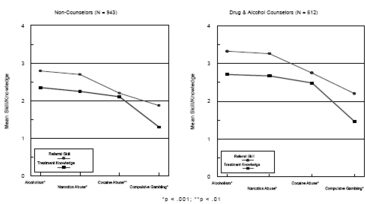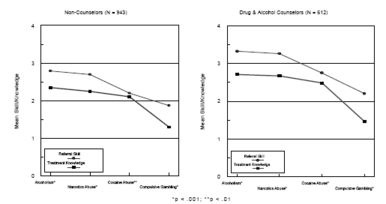One of the consequences of the presence of multiple addictions among pathological gamblers is that clients at substance abuse treatment facilities may also be experiencing gambling problems. In addition, the limited number of pathological gambling treatment facilities may increase the likelihood that pathological gamblers will seek treatment at or be referred to substance abuse treatment facilities. A recent study assessed the treatment training needs of a randomly selected sample (n = 1590) of staff at 237 New England licensed substance abuse treatment facilities. Of this group, 54.5% reported no or very little knowledge of pathological gambling; another 33.2% reported no or very little skill at making referrals to Gamblers Anonymous (G.A.). Respondents had less knowledge of pathological gambling and less skill in making referrals to G.A. than they did for alcoholism, narcotic abuse, and cocaine abuse. In addition, drug and alcohol counselors had significantly higher levels of knowledge and skill in all four treatment areas than did their colleagues (e.g., nurses, social workers, administrators) who were working in the same facilities. Finally, both groups of respondents had significantly more skill at making referrals to G.A. than they had knowledge about pathological gambling. Given the downsizing of health care facilities and the limited availability of specialized gambling treatment clinics, substance abuse treatment facilities would benefit from training existing staff in screening, assessing, and treating pathological gamblers.
Source: Shaffer, H.J., Hall, M.N., & Vander Bilt, J. (1995). Training needs among New England substance abuse treatment providers. (Addiction Training Center of New England Technical Report #040395-NA100). Cambridge, MA: Division on Addictions, Harvard Medical School.
This public education project is funded, in part, by The Andrews Foundation and the Massachusetts Department of Public Health.
This fax may be copied without permission. Please cite The WAGER as the source.
For more information contact the Massachusetts Council on Compulsive Gambling, 190 High Street, Suite 6, Boston, MA 02110.





